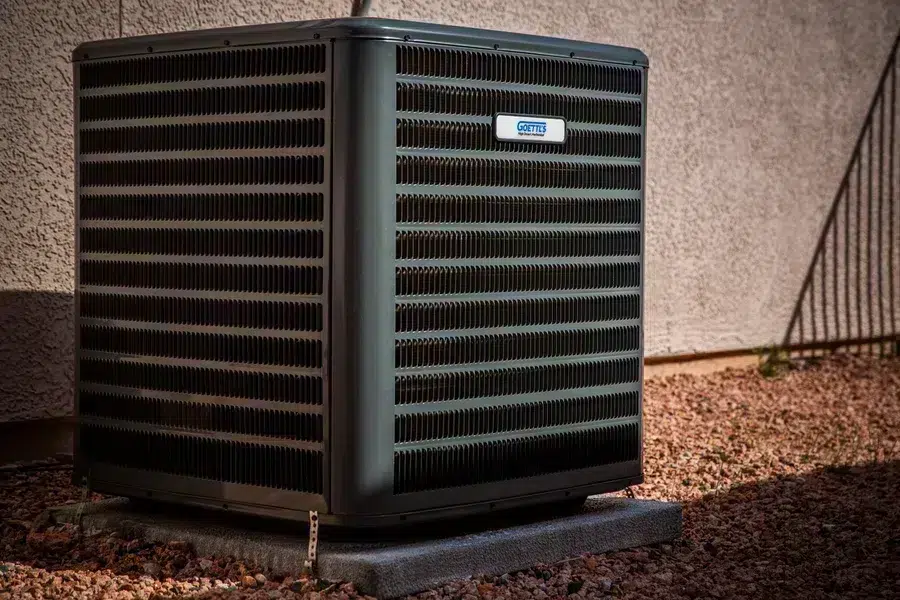Block Out Sunlight
One of the biggest contenders for your cooling system is direct sunlight. While great in the wintertime, sunlight can wreak havoc on your home in the summertime, heating it up by 10 degrees or more. Instead of running your air conditioner to combat this excessive heat, simply block it from reaching your home in the first place.
You can do this in several different ways. Cheap and easy solutions are to use blinds or curtains during the worst of the daytime hours. If you still want to see out your window, consider adding a UV-resistant film or using larger outdoor plants to shade it.
Get Annual Maintenance Service
Before the worst of the summertime weather hits, you should have a professional perform maintenance on your cooling system. This will include actions like fixing broken components, lubricating moving parts, refilling refrigerant levels, and so much more. Apart from keeping the warranty on your AC system active, annual maintenance is a great way to ensure that your cooling system is working at its peak efficiency level.
Supplement With Ceiling Fans
One of the best ways to prevent your cooling system from overworking is to supplement it with ceiling fans. You should install fans in the most frequently used rooms in your home. When these fans spin in a counterclockwise direction, they force air down onto your body. This helps to wick away sweat and cool your body temperature.
When your body feels colder, you can turn up the temperature setting on your thermostat. This translates to your air conditioning system running less. The best part is that ceiling fans don’t use a lot of energy, and you only need to have fans running in rooms that people are actually in.
Keep Your Outdoor Unit Clear
The outdoor condenser unit for your air conditioning system is responsible for dispersing hot air from inside your home to the outdoors. In order for it to do this effectively, the grates on your outdoor unit need to be free from obstructions. A good rule of thumb is to allow at least 3 feet of open space around the entire unit. Make it a habit to check your unit every couple of weeks so that you can remove any debris, like leaves or greenery, that end up blocking your unit.
Use Exhaust Fans Often
When humidity gets trapped inside your home, it can make you feel much hotter. This is because the sweat on your body can’t be efficiently evaporated when humidity levels are high. As your body warms up in a humid climate, you end up turning down your thermostat to compensate for the uncomfortable environment.
You can easily prevent this humidity problem by using your exhaust fans. Each full bathroom in your home should have an exhaust fan that you can turn on to suck up the steam. Additionally, your stove should have a rangehood that you can turn on when you’re cooking to easily vent the steam outdoors.
Seal Up Air Gaps
As your house settles and expansion and contraction happen each year, it’s not uncommon for air gaps to develop on your exterior walls. These can happen around doors and windows or even at your light switches and outlets. Unfortunately, these air gaps allow warm air to seep into your home, causing your cooling system to run more often to keep your home adequately comfortable.
A great way to ensure that your cooling system isn’t overworking to combat this excess heat is to seal up those leaks. Air leaks around your doors and windows can be easily addressed with weatherstripping or caulking. When it comes to leaks at your light switches and receptacles, you’ll want to purchase foam inserts. These get positioned right behind the cover plate.
Vent Your Attic
There’s no denying the fact that direct sunlight can heat up any surface tremendously. When it comes to your roof, over time, heat can penetrate down underneath your shingles and heat up your attic. When there is inadequate ventilation, this can cause your attic to heat up to temperatures higher than your insulation can resist.
The heat will then travel through your insulation and into your home, causing your air conditioning unit to kick on to keep your home cool and comfortable. To prevent this overload of heat from your attic, you need to have it properly ventilated. This can include fans that turn on when temperatures hit a certain level or even more complex systems.
Avoid Creating Heat Inside Your Home
Activities like running your dryer and cooking can introduce unnecessary heat into your home that your cooling system has to combat. It’s a good idea to invest in alternative activities that don’t add excess heat to your home. For example, consider adding a clothesline outside so that you can easily hang dry your clothes and skip the dryer entirely. Consider using a grill or microwave for cooking or preparing cold meals.
Consider Upgrading
The efficiency of cooling systems has drastically improved over the last 10 to 15 years. A seasonal energy efficient rating, known as SEER, is a number given to each cooling unit to mark its efficiency level. The higher the number, the better.
Traditional standards required a minimum SEER rating of 10 to be met by manufacturers. Today, AC manufacturers must meet higher standards between 13 and 15, depending on the region in which the cooling system is installed. If you have a cooling system that is 10 years old or more, it’s highly likely that it doesn’t meet or exceed the minimum SEER standards of today. Upgrading can save you a bundle of money on your summertime energy bills, even during the worst of the heat waves.
Excellent AC Service
Goettl’s High Desert Mechanical offers excellent AC service for the entire Camp Verde, AZ region. Our highly knowledgeable HVAC technicians can also assist with all of your heating, plumbing, ductless mini-split, indoor air quality, and commercial needs. Simply give us a buzz today to schedule your next service appointment.




